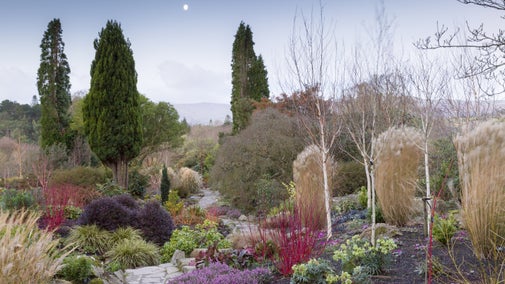
Discover more in Wales
A Celtic land with an industrial past steeped in myth, legend, poetry and song. Croeso i Gymru.

Wildflower meadows are an important part of our natural and cultural heritage, yet across the UK they have declined by 97 per cent since the 1930s. However, we've been working hard to revive and restore these precious landscapes across Wales, from the valleys of Eryri (Snowdonia) to the coastal fields of Ceredigion. Learn more about our work and where you can see meadows in Wales.
During the Second World War, ancient wildflower meadows were cultivated to support the national drive to increase food production. Increased ploughing, drainage, and fertiliser and herbicide application contributed to the loss of a staggering 7.5 million acres of wildflower grassland across the UK.
Today, modern farming methods favour silage fields which have as few as two or three plant species, often without a single flowering plant. This has resulted in many iconic flower species being added to a watch list, which has put the wildlife that depends on them under threat.
We’re carefully managing meadows across Wales to help them to thrive, and we’ve now restored over 213 hectares, or an area that’s about 50 times as big as the Principality Stadium in Cardiff.
Our work includes scarifying, cutting, and allowing winter grazing before and after sowing seeds, to give them a good chance at germinating and growing. Rangers then collect seeds from mature meadows and scatter them in new fields so they can flourish too.
With over 40 per cent of the UK’s remaining wildflower meadows existing in Wales, we have plenty of places for you to explore these natural landscapes and get closer to nature.

Nestled within 80-acres of world-class garden, there are three thriving wildflower meadows to explore at Bodnant - Old Park, Furnace Meadow, and Cae Poeth. Thanks to a traditional grassland management plan, they’re all flourishing and as you explore the mown paths from late spring through to its cutting in late August, you’ll find hundreds of wildflowers in a rainbow of colours, including four different species of delicate orchid.

Since 2016, 16-acres of hay meadow next to Chirk Castle’s portcullis have been transformed into a species-rich meadow that are now full of the sounds of butterflies, bees, birds, and other wildlife. Escape into nature as you explore winding grass paths and spot many different varieties of wildflowers, including the rare and declining Greater butterfly-orchid that was recorded in the meadow for the first time in 2022. Don’t miss the Mindful Meadow too, a reflective space for people to connect to nature, by the Kitchen Garden.

Whether you’re visiting the 1200-acre countryside estate, or the 18th-century Grade I listed walled garden, there are plenty of colourful meadows to explore at Erddig. Take a stroll amongst the wildflowers that fill the banks of the garden’s ‘canals’ or boating lakes, or follow the marked route across the estate to Plas Gronno, where the restored meadow is overflowing with yellow rattle, cat’s ear, wild carrot and grass vetchling.

In the grounds of this dramatic Neo-norman castle, we’ve established two new meadows that that are awash with wildflowers throughout the warm summer months. Find a quiet spot to enjoy a picnic and immerse yourself in nature as you listen to humming bees, take in the spectacular view of Eryri (Snowdonia), and watch the swooping swallows that come to feed on the different insects that are supported by the flowers and grasses.

Once a muddy rugby pitch, Cae Maes y Frân is now one of Anglesey’s Coronation Meadows, recognised for its abundant, species-rich, wildlife. Explore five vibrant acres that are brimming with naturally occurring plants, grasses, and flowers such as wild orchids, red clover, ox-eye daisy, and meadow buttercups, all of which support our native bees and other insects, animals, and birds.

Nestled above Plas yn Rhiw’s delightful manor house you’ll find a meadow and orchard with some of the best views in Wales. Thanks to the local primary school children, the meadow is flourishing and full of the sound of buzzing with insects and calling birds which include swallows, house martins and buzzards. Take a seat on one of the perfectly placed benches and enjoy the views whilst you’re surrounded by nature.

This traditional Welsh estate set in the wooded Aeron valley is full of bird song, colour, and wildlife during the summer months. Look for kingfishers and dippers as you take a stroll alongside the river or watch swallows feeding over the traditional hay meadows that surround the Grade I listed Georgian villa. With 50 different species of grasses and herbs filling this beautiful spot, there’s plenty to discover.

Located between Colby’s tranquil woodlands and trickling streams are four-acres of colourful flood meadow that many creatures call home. Each year we allow the grasses and wildflowers to grow on into late summer, only cutting them when they have set seed. In doing so, we provide the perfect habitat for field mice, voles, bats, frogs, toads, butterflies, and a wide variety of different birds

This 800-acre estate is rich with diverse habitats, including rich flowering hay meadows in the Outer Park and Castle Field. Full of colour and home to some of Britain’s most elusive mammals and birds - including woodpeckers, white tree creepers and spotted flycatchers – there’s plenty to discover from spring until late summer, when they’re cut and provide fodder for the heard of White Park Cattle.

This 55-acre restoration garden has plenty to explore in the summer months. As well in the billowing herbaceous borders, colour is plentiful in the different meadows that have been created to increase the diversity of pollinators and insects in the garden. Don’t miss the ‘mini meadows’ on the Great Lawn that are cut into different shapes each year to limit soil compaction and help the brightly coloured waxcaps thrive later in autumn.

In 2021, seed donated by the National Botanic Garden of Wales was used to enrich the grassland around this spectacular Neo-gothic folly, perched high on a hill above the village of Llanarthne. This local seed has created a 3-hectares of thriving Welsh meadow, recognised for its local character, and there are plenty of colourful blooms to discover as well as glorious views across the surrounding countryside.

Nature-friendly farming practices have improved biodiversity at Rhosili and the Vile, a restored example of medieval strip farming, is thriving thanks to the introduction of traditional arable crops and more than 15 hectares of wildflower meadows. With colourful clover, cornfield annuals, poppies and sunflowers providing a rich food source for bees, butterflies, choughs, and overwintering birds, it’s the perfect place to take a relaxing stroll and escape into nature.

Stretching straight to the sea, the Southwood Estate is a charming coastal spot that’s full of scenic surprises, one of its best being its traditionally managed meadows. Thanks to green hay transfers, late summer cutting, and the grazing of Welsh black cattle, 24-hectares of species poor, agriculture land have been transformed into a wildflower rich landscape that is a haven for nature and photographers alike.

A Celtic land with an industrial past steeped in myth, legend, poetry and song. Croeso i Gymru.
Visit an amazing collection of gardens and parks in Wales. From walled gardens to arboretums and countryside estates, there’s plenty to explore.

Explore wide open landscapes, gentler coastal strolls or energetic hikes for something a little more challenging. We've rounded up some of the best places to walk in Wales.

Discover how our nature friendly farming practices are protecting rare habitats and species, preventing floods, and helping wildlife thrive in Wales.
